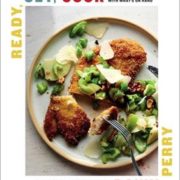“Shuk: From Market to Table, the Heart of Israeli Home Cooking” (Einat Admony and Janna Gur) by Lisa E. Brown
Do you know what a shuk is?
I must admit that the term was new to me when I came across a cookbook here at the Joplin Public Library. Thankfully, the opening pages of Shuk: From Market to Table, the Heart of Israeli Home Cooking by Einat Admony and Janna Gur define the term in detail. Simply put, a shuk is an open-air marketplace in towns and cities where Israelis flock to buy produce, meats, spices, and so on.
Although I was previously unfamiliar with the term “shuk,” I’m no stranger to food from Israel and its neighbors. In fact, being fond of “appetizer” meals, I’ve been known to put together a platter of pita, labneh (a tangy, yogurt-based cheese), za’atar-spiced tomatoes, baba ghanoush (eggplant dip) and hummus (chickpea dip) for dinner. Needless to say, I was eager to delve into this cookbook!
If you are new to Israeli cooking, never fear. Shuk is very user-friendly.
There are excellent glossaries that cover popular ingredients, from tahini (sesame paste), to preserved lemons, to the above-mentioned za’atar, a mixture of herbs, sesame seeds and the delightfully sour, beautifully colored sumac.
And if you are worried about where to find the more exotic ingredients in our area, never fear. Fox Farm Whole Foods carries many of them, and there’s always the Internet. Many of the vegetables can be found at area farmers markets such as Joplin Empire Market and Webb City Farmers Market – in season, of course.
The photographs are gorgeous, a feast for the eyes and a temptation to the stomach. So colorful and zesty, they leap off the page and invite you to try the dishes.
One of my favorite aspects of Shuk is how it highlights individual shuks, exploring them with images and words. It offers helpful hints on the story behind the shuks, the vibe and when to visit. As someone who loves to travel, it brings home the local flavors and colors of Israel.
And the recipes. I can’t neglect to mention the recipes! So much yum and goodness for all palates.
I went through Shuk page by page, marking recipes that I wanted to try with little bits of paper. And there were many of them!
I was intrigued by the Israeli Salad. For years I have relied on the Israeli za’atar salad recipe from one of my old Moosewood cookbooks, but Shuk’s includes carrots, which I never would have thought of adding. I’m sure this particular vegetable brings a crunchy sweetness to counterbalance the tartness of the lemon juice and sumac.
And then there’s the Quinoa Tabbouleh with Kale and Dried Cranberries. I love traditional tabbouleh, in all its tomatoey, herby goodness. But it’s a summer salad, and I try to cook seasonally. However, making it with kale and cranberries makes it perfect for fall and winter.
Much to my delight, there were multiple pages covering that gorgeous nightshade vegetable known as eggplant. I adore eggplant. (It’s not for everyone, I agree, but I would contend that if you don’t like it, you just haven’t had it prepared the right way.) Here there are recipes for basic dips and spreads, as well as an intriguing Sweet and Sour Baked Eggplant.
And the humble chickpea gets its due, as well, along with its partner in sesame goodness, tahini. Did you know that if you soak and boil dried chickpeas with a little baking soda, it can transform your hummus into something especially silky and smooth?
Looking for meatier fare? There are dishes that utilize chicken, seafood, beef and lamb.
And we can’t forget the desserts! The tahini shortbread cookies sound delicious, and I also tagged a recipe for Fresh Orange Pound Cake that I fully intend to try.
I’ve just touched on a handful of reasons why Shuk is a terrific new addition to the world of cookbooks, but see for yourself. You can find it shelved with the new non-fiction at the Joplin Public Library.
Find in Catalog











